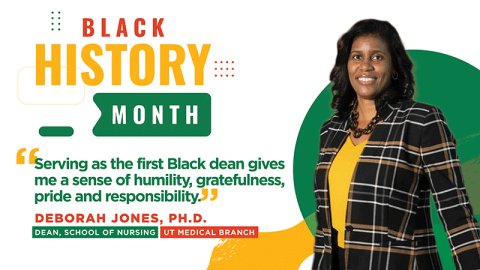Deborah Jones, PhD
Senior Vice President and Dean, School of Nursing
UT Medical Branch
Growing up in an old Virginia railroad town (Crewe) with a population that’s still less than 2,500 in a county (Nottoway) with less than 16,000 people, Deborah didn’t always know the scale of opportunity that existed beyond the county lines. But it was there that instilled in her a strong belief in the power of community and that drives her commitment to give back to that community. As a doctoral student at Virginia Commonwealth University, she received the Black History in the Making Award. Looking back, she says, it almost seems prophetic. Dr. Jones has indeed made history, previously at UTHealth Houston School of Nursing as its first Black department chair and then at UT Medical Branch as the first Black dean of the School of Nursing and the first nurse to serve as the institution’s provost.
As you celebrate Black History Month, what has been foremost on your mind?
Black History Month is dedicated to raising awareness of the achievements and contributions of African Americans to civilization and meant to celebrate and honor the importance of those in shaping our American history and culture. Ideally, we would not need a month to celebrate Black history, rather it would be recognized and deeply embedded in our history as a whole. However, until then, I celebrate Black History Month by honoring those before me who have paved the way and removed barriers that may have made my journey possible, but also by doing my part to ensure I do the same for those coming behind me. I also think of the work yet to be done. I think we all have a role to play in making sure those aspiring to make a difference, or, who like me, did not see their potential early on, are being developed and positioned to do just that. We are ultimately all in this together, and despite wishful thinking, none of us will be here forever, so why not equip those coming behind us to do better? That means sharing knowledge, removing obstacles and leaving a legacy that lives beyond us. In other words, to pay it forward in however it makes sense to us. There is no small deed or non-impactful act that one can do in the spirit of gratitude and appreciation.
You are the first Black, male or female, to hold the position of Dean of the School of Nursing. When you accepted the position, what was it like to know you were the one to break through that glass ceiling?
I did not realize that I was the first Black to hold the decanal role at the UTMB School of Nursing until about two years into the position. We were working on an annual magazine in recognition of the 130th anniversary of the School of Nursing (which opened as the John Sealy Hospital Training School for Nurses in 1890) when this was brought to my attention. My immediate feelings were of surprise followed by a bit of skepticism. Surely in 130 years, there has been another. In fact, there hasn’t. Serving as the first Black dean gives me a sense of humility, gratefulness, pride and responsibility -- to ensure that I am not the last to mentor others, to be prepared, to remove the barriers and expand the legacy of excellence for which our school is known. As a first-generation college graduate, I had no concept of one day becoming a dean or provost or having the opportunity to lead and shape the development of so many people. Although my parents both believe in education as a key to success, neither had more than a couple of years of technical training post-high school. So, the pride that they carry in recognition of my continued growth and development propels me to do more.
What impact do you believe being the first Black dean at the School of Nursing has had on others such as faculty, staff, students and potential students?
Because my leadership goals to create a healthy work environment and learn about different cultures to foster innovation, curiosity, inclusiveness and excellence are relevant regardless of background, race or ethnicity, I don’t often think about the significance of being the first Black dean. However, there are many examples that highlight the impact of this honor. For instance, I often get messages of gratitude from students for helping them see the possibilities available to them because of my holding the position. In addition, the number of Black faculty at the School of Nursing has increased from 3% (two of 66 total faculty) when I began, to 14% (11 of 76) today. Our student diversity has also increased. Although I think intentional efforts to foster a welcoming culture and display empathy contribute to these increases, it really does matter to students and faculty to see someone who looks like them when they pull up the web page in consideration of joining the school. Mentorship has also played a vital role in my professional journey, and I think it is one of the most important elements to success. It is essential to have a cadre of mentors who may relate to or assist those who are not so sure of the path forward because it is not one that they have witnessed or been exposed to before.


